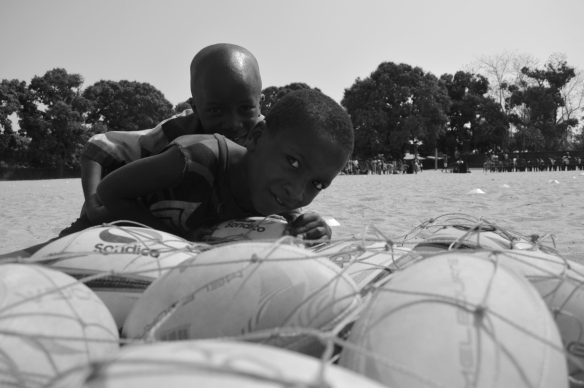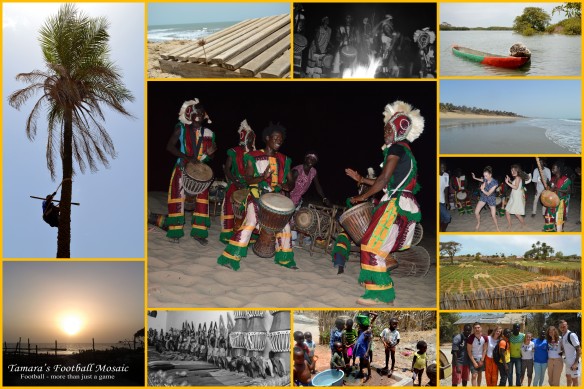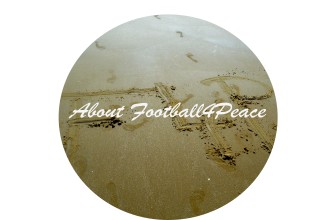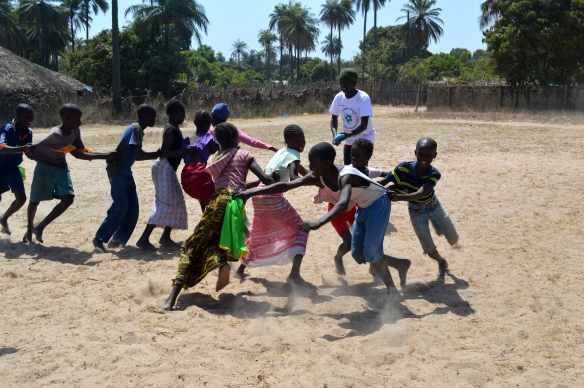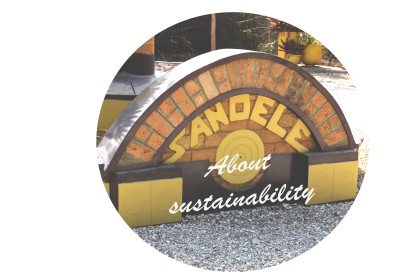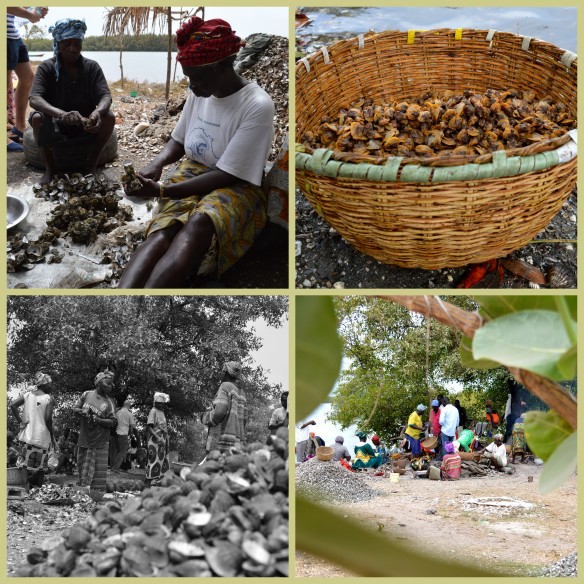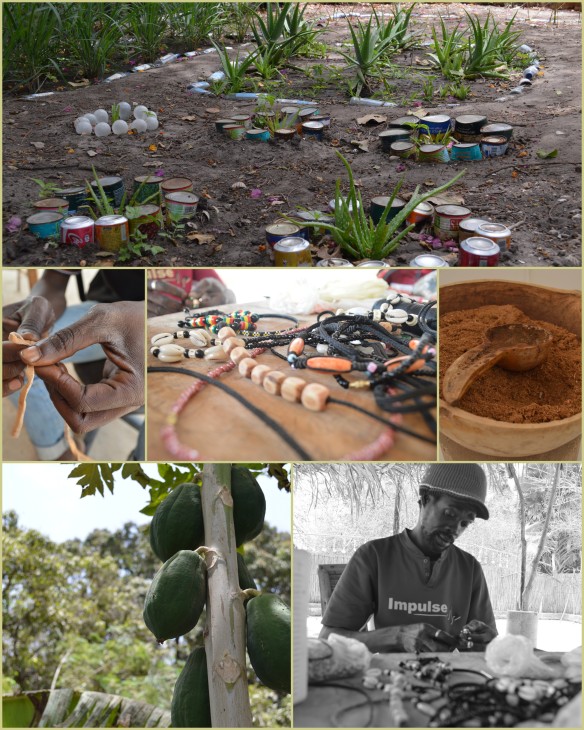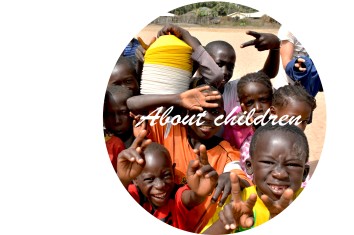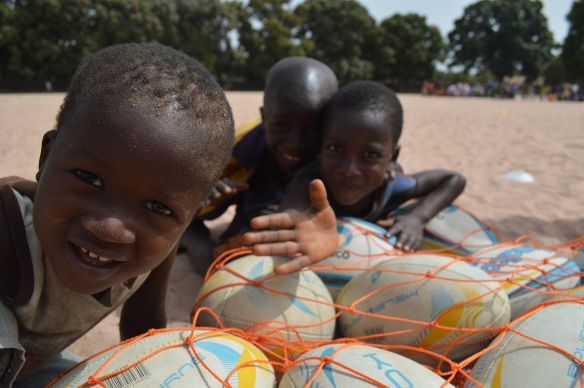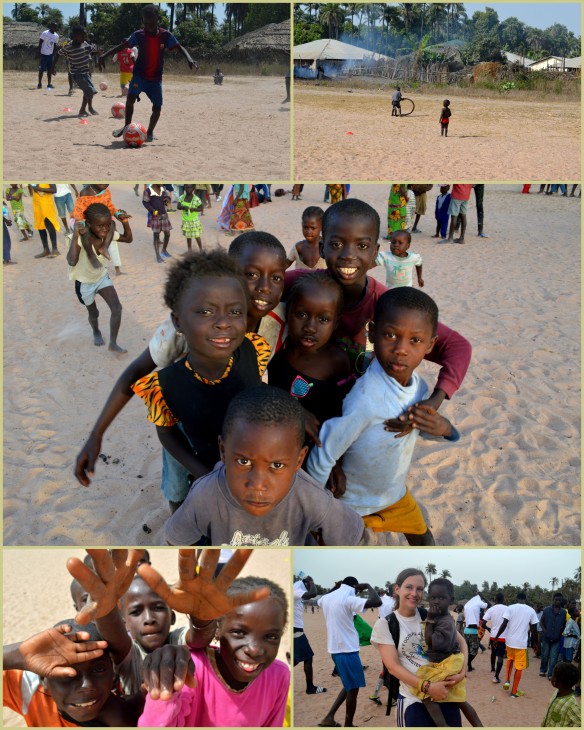Imagine you have an opportunity to combine your biggest passions in life and spend a week on your favourite continent/country, play your favourite sport, meet amazing people and simply feel happy all the time. It probably sounds like a commercial in a tourist magazine, but hey – it gets even better than simple tourist vacation!
Africa and football have been my passions and fields of interest for a long time. The first time I experienced them together was in South Africa for the FIFA World Cup, which were the best two weeks in my life. After four years I went to Africa again, again for football. But this time it was completely different. I joined Football for Peace (F4P), a sport-for-development-and-peace programme, in tiny West African country – the Gambia. We spent a week between 18 and 25 April in a small village of Kartong, coaching the local children, being trained as trainers, hanging out with the local coaches and overall – enjoying the Gambian sun, positive and friendly environment and deliciousss food. There are many things to say and my mind is overflown with memories. However, I’ll try to organise my thoughts and put them on the paper (well, technically, on the screen). I hope this will bring a bit of the Gambian sun in your room 🙂
Oh, and to make sense of the post’s title, a Nigerian song Pullover by Kcee and Wizkid was our specil anthem 😉
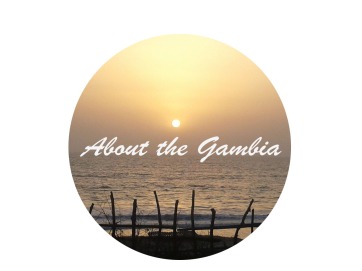 To be honest, the Gambia is not difficult to be missed on the world map – it’s the smallest country in Africa. There are slightly less than 2 million people, who are mainly of Mandinka ethnic origin. Other ethnic groups involve Fula, Wolof/Serer, Jola, Serahuli and others. The predominant religion is Islam, practised by around 90 % of the population. Around 8 % are Christians and another 2 % adhere to indigenous beliefs. The country is situated on either side of the Gambia River, which flows into the Atlantic Ocean. The Gambia is surrounded on three sides by Senegal and has only 80 km of the coastline (which is still the double of the Slovenian coast ;)) on the Atlantic Ocean. Due to its proximity to the Equator it has a tropical climate with the hot season from December to May and the rainy season from June to November. The main Gambian industry is tourism. Agriculture accounts for roughly 30% of gross domestic product (GDP) and employs about 70% of the labour force.
To be honest, the Gambia is not difficult to be missed on the world map – it’s the smallest country in Africa. There are slightly less than 2 million people, who are mainly of Mandinka ethnic origin. Other ethnic groups involve Fula, Wolof/Serer, Jola, Serahuli and others. The predominant religion is Islam, practised by around 90 % of the population. Around 8 % are Christians and another 2 % adhere to indigenous beliefs. The country is situated on either side of the Gambia River, which flows into the Atlantic Ocean. The Gambia is surrounded on three sides by Senegal and has only 80 km of the coastline (which is still the double of the Slovenian coast ;)) on the Atlantic Ocean. Due to its proximity to the Equator it has a tropical climate with the hot season from December to May and the rainy season from June to November. The main Gambian industry is tourism. Agriculture accounts for roughly 30% of gross domestic product (GDP) and employs about 70% of the labour force.
Although the territory of the Gambia was reached by the Portuguese already in the mid 15th century, it was later a bone of contention between the French and the English. The British Empire occupied Gambia in 1758. Placing and keeping the colony around the Gambia River was of crucial importance for the transatlantic slave trade – around three million slaves were taken from this colony in the course of three centuries. The Gambia achieved its independence in 1965 as a constitutional monarchy within the Commonwealth. In 1970, it became a republic with its first president Dawda Kairaba Jawara, who was re-elected five times. In 1994, the Armed Forces Provisional Ruling Council deposed the Jawara government and banned opposition political activity. Yahya A.J.J. Jammeh, chairman of the AFPRC, became head of state and remains the president to this day, meaning the Gambia has only had two presidents since its independence. It’s interesting to note that there are no tensions between the ethnic or religious groups – peace is an important component of the society and the Gambian people are really proud of that.
People I met were extremely nice, open-minded and helpful. Although according to the official statistics, a third of the population lives below the international poverty line of $1,25 per day, the people are very positive, as well as creative in terms of providing for their basic life needs. I know that their way of life is not easy at all and that there is a daily struggle for food, water and earnings to provide for the family. But when I observed the people, especially in the evening, when everyone came out on the street, talked, danced or just friendly waved to us, strangers (if I waved to a random person here in England or in Slovenia, everyone would think I’m totally weird), I realised it’s not Africa that needs the development aid – we need it, not in economic, but in humane and personal terms. Although the Gambians are materially much more deprived, they are at the same time much happier, complain less and know how to genuinely smile, even if to a complete stranger. There, I felt much more at home than in many European countries! It’s true – the Gambia is indeed a smiling coast!
F4P International was established at the University of Brighton in 2001 and it operates on the voluntary basis on the international level. The project approaches football in a bit different, non-competitive way – children are not taught football skills, but values such as trust, respect, responsibility, equity and inclusion. Children play different teambuilding games through which they learn how to trust each other and how to be responsible for one another and for their teams. Teams are normally mixed in terms of gender, race, ethnicity, religion etc. so that children understand the importance of inclusion, as well as that they develop friendships with people who are different from them and even overcome prejudices and stereotypes. During the game, they are supported to help each other, especially the opponents, shake hands before and after the game, not to be too competitive, to pass the ball to all the co-players equally etc. The winner is not announced just on the basis of goals scored, but according to the fair-play points that are given to the teams.
Such values based approach to coaching is of high significance especially in/between the societies that are in conflict. That’s actually why the initial idea developed – to use football to bring together children from divided Northern Ireland, where Protestants and Catholics viewe(d) each other as the enemies, and later from Palestine and Israel. F4P has held workshops and trainings in the UK, in Northern Ireland, Israel, Germany, The Gambia, Czech Republic, South Korea, South Africa and it’s even spreading. The F4P camps and events consist both of football and other sport-related games and off-pitch activities that together provide a platform for integration and inclusion of children. Programmes that promote inclusion, respect, equality and similar values through fun, relaxed, informal and popular activities such as football or other sports and leisure games therefore bear a big potential to eliminate/prevent stereotypes and to bring children together regardless of their race, gender, religion, ethnicity, nationality, sexuality and other categories of identity.
Critics of sport-for-development sector normally warn about the ideological underpinnings of such projects that stem from the Western neo-liberal values. While this concern should always be taken into account when conducting the projects abroad and cultural differences and local socio-political situation should play the leading role in framing such projects, I don’t think F4P is trying to impose any ‘Western values’ or interfere too much with local culture. I could see this in the Gambia, which was my first international football experience. Not only we played football and ‘our’ games, but we also included their local games in the programme. So just as much as we were teaching and coaching, we were learning as well. That’s why I experienced F4P in the Gambia more as a cultural/sports exchange rather than SDP intervention. Another important aspect of F4P is its sustainable approach – it doesn’t just go to a foreign country, play there for a while and then leave. Instead, we were coached as trainers together with the local coaches, who will be able to deliver values based coaching even when we’re gone (although F4P will be back in December 🙂 ). Training the local coaches therefore ensures sustainability and potential continuum for children, as well as it develops coaching, organisational and life skills of the coaches.
Some of the F4P coaches, who have been abroad with F4P before, said that Gambia is different from other projects since it’s not really a divided society. For example, in Israel, children from Jewish and Arab communities wouldn’t even talk to each other on the first day, let alone play together and have physical contact. But throughout the week, social bonds would gradually develop and through sport and fun the children from antagonistic communities would start to humanise each other, understand that they have a lot in common and that there is actually no reason to hate each other. Friendships would develop between children who have been told since their birth that they need to be enemies. I love Mandela’s quote (I know, I’ve used it a lot of times already, but it’s really something I believe in): “No one is born hating another person because of the colour of his skin, or his background, or his religion. People must learn to hate, and if they can learn to hate, they can be taught to love, for love comes more naturally to the human heart than its opposite”. In the Gambia, fortunately, there is no such conflict. Our kids were friends from the first day, especially because a lot of them knew each other before. However, they achieved a progress in terms of understanding the five values (respect, responsibility, inclusion, equity and trust) and applying them not only on the pitch, but also beyond the football arena. For example, before the coaching sessions every day, we all together picked up the litter from the ground to show respect for the environment and through that, they understood the importance of taking care of the areas they live in. They understood that they need to show respect and responsibility not only in football, but also in school, in their families etc. When we were asking them who they will show respect for in their lives, a girl replied: “for every human being” – it was one of my favourite moments.
Apart from football, games and discussing the values there were countless moments of dancing and singing. I loved how we concluded almost every game with a little dance – and believe me, those kids are sooo talented, I loved their moves! 🙂
We were staying in a local eco-resort Sandele. Although it was founded and it’s run by an English couple, it only employs local people, uses local nature-friendly materials and buys the goods from the locals and local shops. It’s run by the solar and wind power and therefore uses only renewable sources of energy. Hot water showers are heated by the sun and the toilets are composting. People are employed to do all kinds of work, ranging from cooking and cleaning to building facilities and crafts making. In general, the Kartong village has a reputation of an eco-friendly village. We also visited a place where women collect the oyster and sell them. The community we met is a part of the Try Oyster Women Association which is working to raise the standard of living of these women to become self-sufficient through improved cultivation techniques. We tried the oysters and they were delicious!
I loved working with children every day, not just because I’m still a big kid, but because they inspired me a lot, and not just in terms of their football skills. Besides being super cute, they were also very friendly, respectful and always trying to hold our hands and play with us – I know that was in big part because we were strangers and different from their peers, but having worked with children from Slovenia and England before, I can say that they are much more joyful. Sometimes I am sad when I see children at home playing only with their computers and phones – if you send a kid out today, he/she will ask: “What I am supposed to do outside?” A lot of children in Europe have simply forgotten or not even learnt how to play simple games outside and how to use the environment for joy. Children in the Gambia, on the other side, use everything they find for the game – used tires, empty cans, wooden sticks etc. Of course, they also love playing football – barefooted, and their skills are really good, they simply have the touch for the ball. What I’m saying is that they are much more creative than European children, who are over-protected by their parents. That’s why I’m saying the ‘development aid’ should flow both ways – Europe (and the rest of the ‘developed’ world) should stop in all its hectic rushing towards god knows where and reflect on some very basic principles of life and joy. However, although there are many talented kids, it’s true that they have much less opportunities to realise their potentials. I’ve talked to two boys – one of them loves painting and would like to become a professional painter and the other one would like to pursue his career as a doctor and help people. Both seemed very passionate, but they complained that their families can’t afford sending them to the university. Therefore I hope more will be done in the Gambia regarding the education system so that children will be able to follow their dreams, realise their potentials and develop various skills. As well, I hope F4P has given/will give them not only motivation, but especially some of the values and life skills that will contribute positively to their future steps.

